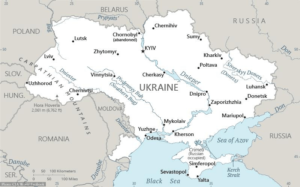The Shadow of Chernobyl: Escalating Conflict and the Peril of Nuclear Disaster in Eastern Europe
The specter of nuclear catastrophe looms large over Eastern Europe as the ongoing conflict between Russia and Ukraine intensifies, particularly in the vicinity of Ukrainian nuclear facilities. The escalating attacks near these sensitive sites have ignited global concerns, raising the chilling possibility of a repeat of the Chernobyl disaster, or worse. This essay will explore the dangerous implications of this escalating conflict, examining the potential consequences of a nuclear incident and the urgent need for international intervention to avert a humanitarian crisis of unprecedented scale.

The Vulnerability of Nuclear Facilities in War Zones
The presence of active nuclear power plants within a war zone presents an extraordinary and terrifying risk. These facilities, designed for peaceful energy production, become incredibly vulnerable targets in times of conflict. The potential for damage, whether intentional or accidental, is immense. A direct hit on a reactor could lead to a meltdown, releasing radioactive materials into the surrounding environment. Even damage to supporting infrastructure, such as cooling systems or power grids, could trigger a catastrophic event. The consequences would extend far beyond the borders of Ukraine and Russia, contaminating vast areas of land, poisoning water supplies, and causing long-term health issues for generations to come.
The Precariousness of the Current Situation
The current situation is particularly precarious due to the ongoing nature of the conflict. The fog of war, the chaos and confusion inherent in armed conflict, increase the likelihood of miscalculations and accidents. The disruption of communication lines, the displacement of personnel, and the potential for sabotage all contribute to a heightened risk of a nuclear incident. Furthermore, the presence of military activity near these facilities makes them potential targets, whether intentionally or unintentionally. The use of heavy weaponry, including missiles and artillery, increases the risk of collateral damage, even if the facilities are not the primary target.
The Imperative for International Intervention
The international community has a crucial role to play in preventing a nuclear disaster. Diplomatic efforts must be redoubled to secure a ceasefire and create a safe zone around Ukrainian nuclear facilities. The International Atomic Energy Agency (IAEA) must be granted unimpeded access to these sites to monitor their safety and ensure that all necessary precautions are being taken. It is imperative that all parties involved in the conflict recognize the catastrophic consequences of a nuclear incident and exercise the utmost restraint. The lives of millions, not just in Ukraine and Russia, but across Europe and beyond, depend on it.
The Widening Humanitarian Crisis
Beyond the immediate threat of a nuclear incident, the escalating conflict in Eastern Europe has already created a humanitarian crisis. Millions of Ukrainians have been displaced from their homes, seeking refuge in neighboring countries or within safer regions of Ukraine. The destruction of infrastructure, including hospitals and schools, has further exacerbated the suffering of the civilian population. The international community must provide humanitarian aid to those affected by the conflict, ensuring access to food, water, shelter, and medical care.
A Call for Peace and averting Catastrophe
The situation in Eastern Europe is a stark reminder of the fragility of peace and the devastating consequences of war. The threat of nuclear disaster adds a new dimension of urgency to the need for a peaceful resolution. The international community must act decisively to prevent a catastrophe that would have global repercussions. The shadow of Chernobyl serves as a chilling warning, reminding us of the devastating power of nuclear energy and the imperative to prevent its misuse. The future of Europe, and indeed the world, depends on our collective ability to avert a nuclear disaster and secure a lasting peace in Eastern Europe.










